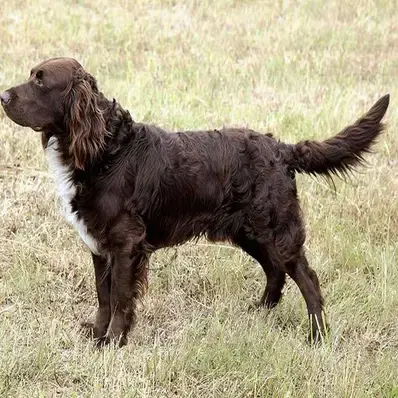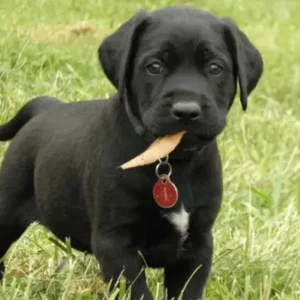Deutscher Wachtelhund History/Origin
In the 1880s, German hunters set out to recreate the Stober, a versatile breed known for its scent-trailing abilities, mentioned as early as 1719. The Stober had tracking skills similar to a bloodhound. Hunters in Bavaria found remnants of the dog breed and bred them with other hunting spaniels, creating the Deutscher Wachtelhund (Deutscher Wachtelhund pronunciation ‘Valk-tel-hund’), officially recognized in 1903. The German Wachtelhund Club, Verein für Deutsche Wachtelhund (VDW), restricts ownership to gamekeepers and hunters, preventing the breed from being sold to the non-hunting public.
Deutscher Wachtelhund History- Source: AKC.org
Several Wachtelhunds were brought to the United States in the late 1950s and 1960s, though they were only bred a few times, resulting in 17 dogs, none of which were registered in North America. However, in Canada, hunters and guides have used the Deutscher Wachtelhund as flushers, retrievers, and to track wounded black bears over the past two decades.
In 1993 and 1994, Dave Pepe imported two Wachtelhunds into the U.S., breeding them four times and producing 38 pups. Since then, additional dogs have been imported, leading to more breeding efforts. Today, there are an estimated 100 to 150 Deutscher Wachtelhunds in the U.S. and Canada.
Deutscher Wachtelhund Personality
The Deutscher Wachtelhund is known for its vibrant and friendly personality, making it a welcoming companion. This versatile gundog is outgoing, greeting everyone with enthusiasm and showing no signs of fear or timidity.
Despite being an aggressive hunter with scenting abilities comparable to a Bloodhound, the Deutscher Wachtelhund is affectionate and does well with children. However, he may be too energetic for toddlers or young kids. His loyal nature makes him a devoted family dog, but he thrives best with an owner who is firm and consistent in training.
- Potential Challenges
While the Deutscher Wachtelhund is a wonderful companion, he does come with a few challenges. His strong prey drive means small pets, like birds or small furry animals, must be kept in sturdy cages, as he may not always see them as part of the family.
Additionally, he may not respect cats unless raised with them from a young age. Training must be ongoing to ensure he understands his role within the family, and he requires a secure yard with a sturdy fence to prevent him from wandering off in search of prey.
Deutscher Wachtelhund Physical Appearance
The Deutscher Wachtelhund is a well-proportioned, athletic gundog with a robust build. These purebred dogs have a distinctive appearance with a strong, muscular body and a keen, expressive face that reflects their alert and energetic nature. Their overall stance is balanced, with a confident and purposeful demeanor.
- Size
Most Deutscher Wachtelhunds weigh between 40 and 55 pounds and stand 18 to 21 inches tall at the shoulder. However, there can be some variation, with individuals occasionally being smaller or larger than this range.
- Coat color
Deutscher Wachtelhunds can have coats in solid brown or Brown Schimmel, which ranges from red to dark with white ticking. Their medium-length coat is thick and has a somewhat harsh texture, and it can be either wavy or curly.
Brown Schimmel Deutscher Wachtelhund- Source: deutscher_wachtelhund
Solid Brown Deutscher Wachtelhund- Source: aika_wachtelhund
Brown and White Deutscher Wachtelhund- Source: AKC.org
Deutscher Wachtelhund Gender Differences
There are very minimal differences in temperament between male and female German Spaniels. Unspayed females may be a bit more moody and independent, but they generally adapt better to being left alone compared to males. Males tend to be more affectionate but can be slightly harder to train.
Additionally, males are slightly larger, usually standing an inch or two taller and weighing 4 to 5 pounds more than females. Ultimately, individual temperament is shaped more by training and upbringing than by gender.
Deutscher Wachtelhund Feed/Nutrition
To meet the Deutscher Wachtelhund’s nutritional needs, including high-quality proteins like chicken, fresh meat, and fish in their diet. Dry dog food designed for active breeds offers a balanced nutrient profile, while fruits such as bananas and vegetables such as broccoli provide essential vitamins and minerals.
An ideal diet for this medium- to large-sized, high-energy breed should be carefully managed to prevent weight gain, which can occur if they are overfed. Stick to a regular feeding schedule, avoid leaving food out throughout the day, and limit treats.
Dietary needs will evolve from puppyhood through adulthood and into senior years. Consult your veterinarian for tailored dietary recommendations, as individual factors such as weight, energy levels, and health vary among dogs.
Deutscher Wachtelhund Health
The Deutscher Wachtelhund is generally a healthy breed, but like many Spaniels, they may be predisposed to certain health conditions. Regular veterinary care and a healthy lifestyle are essential for prevention and early detection of potential issues.
- Elbow Dysplasia and Hip Dysplasia: This inherited joint deformity affects the elbows and hips, leading to mobility issues. While rare in this breed, it can be prevented with responsible breeding, a balanced diet rich in healthy oils, and early detection through regular checkups.
- Patellar Luxation: Patellar luxation occurs when the kneecap slips out of place, causing pain and potential arthritis. Maintaining a healthy weight and regular vet visits can help manage the condition, and severe cases may require surgery.
- Epilepsy: Epilepsy can cause seizures of varying severity in some Deutscher Wachtelhunds. This condition is managed with medication, regular monitoring, and working closely with a veterinarian to reduce seizure frequency.
Deutscher Wachtelhund Care and Grooming
The Deutscher Wachtelhund requires plenty of daily exercise to stay healthy and happy. Aim for 30 to 60 minutes of activity, including brisk walks, jogging, or hiking. In addition to walks, engage them with games like fetch or scent-based activities to tap into their hunting instincts.
Check their ears daily for debris or pests, and clean them as recommended by your vet. Trim their nails once or twice a month before they get too long, and if they click on the floor, it’s time for a trim. Maintaining good oral hygiene is also crucial, so aim to brush their teeth daily to prevent dental issues, following your vet’s instructions.
Though not allergy-friendly, their coats should be brushed at least once a week to prevent matting and manage shedding. As natural hunters, Deutscher Wachtelhunds handle both hot and cold weather well but thrive better in colder climates.
Dog training tips: Consistent positive reinforcement can be highly effective with this breed, especially when teaching commands or correcting behavior.
Deutscher Wachtelhund Rescue Groups
Several rescue groups are dedicated to helping Deutscher Wachtelhunds find new homes. These organizations work to rehome dogs in need, offering adoption services and support to potential owners. If you’re considering rescuing a Deutscher Wachtelhund, these groups can connect you with available dogs and guide you through the adoption process.
Deutscher Wachtelhund Price
The price of a Deutscher Wachtelhund typically ranges from $750 to $2,500, depending on factors such as breeder reputation, pedigree, and location.
If you’re looking to buy a Deutscher Wachtelhund, it’s important to find a reputable breeder who prioritizes health, temperament, and proper care. Ensure the breeder provides health clearances for the puppies and allows you to visit their facilities. Prices can vary depending on the breeder’s reputation, the puppy’s lineage, and location.
Interesting Facts
- The Deutscher Wachtelhund is an exceptional swimmer and often excels in water retrieval tasks during hunts.
- In Germany, this breed is primarily owned by hunters and gamekeepers, and it’s rare for non-hunting individuals to own one.
Best For
The Deutscher Wachtelhund is best suited for active individuals or families who enjoy outdoor activities and can meet their high exercise needs. Ideal for experienced dog owners, they thrive with those who can provide consistent training and mental stimulation. They do well in homes with large yards and are great companions for those who love hiking, running, or hunting.
Top Names
| Male Deutscher Wachtelhund Names | Female Deutscher Wachtelhund Names |
| Max | Luna |
| Rex | Bella |
| Leo | Daisy |
| Bruno | Nala |
| Odin | Ruby |









 Deutscher Wachtelhund History- Source:
Deutscher Wachtelhund History- Source: 

 Brown Schimmel Deutscher Wachtelhund- Source:
Brown Schimmel Deutscher Wachtelhund- Source:  Solid Brown Deutscher Wachtelhund- Source:
Solid Brown Deutscher Wachtelhund- Source:  Brown and White Deutscher Wachtelhund- Source:
Brown and White Deutscher Wachtelhund- Source: 







